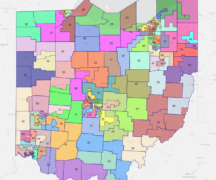BY SUSAN TEBBEN
The Ohio Redistricting Commission once again started work on legislative redistricting in a weekend session Saturday afternoon.
The first meeting centered around a mission to determine who will be drawing the maps that the commission will vote on for the fourth time since the process began in September.
“First, I think we need to come out here this afternoon with a plan as far as the process for the creation a new map,” Gov. Mike DeWine said at the beginning of Saturday’s meeting.
DeWine proposed several different options to get to the March 28 deadline ordered by the Ohio Supreme Court when they struck down the third version of the Statehouse maps.
He said it was important that the commission put in an official resolution that the mapmakers that are settled upon will follow the Ohio Constitution as well as complying with the three decisions released by the state’s highest court. He also asked that the mapmakers be accessible to the members of the commission at any time.
The governor was one of a few commission members who also brought up a letter sent by Ohio Attorney General Dave Yost to the ORC offering up a Republican analyst and a Democratic political science professor who were the authors of maps for the state of Virginia that were unanimously adopted by that state’s supreme court.
Sean Trende was described by Yost as a Republican analyst “well-known to the readers of Real Clear Politics” and Bernie Grofman is noted as a “Democratic professor of political science” at the University of California-Irvine.
Yost’s letter said the Attorney General’s office has “retained” the two to “achieve the level of independent evaluation the court is requiring,” though the commission is not required to use the two or adopt a map proposed by them.
He said he did this after the court proposed that the commission to bring in an independent map drawer to draft a plan.
“They understand the time limits of the court, the terms of the Constitution and the decisions regarding it and are prepared to go to work immediately,” Yost said.
Yost also suggested to the commission that they publish any proposed maps at least 24 hours before a vote, receive progress reports in public from mapmakers prior to the completion of a map and “discuss in public any sticking points between map drafts or particular districts permutations.”
The attorney general wrote in the letter that “daily meetings would not be excessive to respond to what some of you have correctly termed a constitutional crisis.”
Commission members took a largely agreeable stance to all of Yost’s suggestions, but couldn’t decide whether or not to use the suggested mapmakers, leave the job to the four mapmakers already in the process (Ray DiRossi and Blake Springhetti for the GOP and Chris Glassburn and Randall Routt for the Dems), or bring in a mediator possibly recommended by the Ohio Supreme Court.
House Minority Leader Allison Russo said it was important whoever was chosen to start the work was paid through the commission, and that mapmakers work was available to the public.
Auditor Keith Faber would support any of the options, but he said a mediator would require a lot of vetting.
“The parties have to have confidence that the mediator is truly a neutral party, and is somebody they are comfortable sharing information with,” Faber said.
Russo attempted to bring up changing the May 3 primary date because of the impact redistricting has had on it, but the commission spent no time on the topic.
“I’m not sure that the primary date is the concern of the commission,” Faber said while talking about other solutions to mapmaking.
Republican members of the commission did take some time to express their frustration with the supreme court in the decisions that have been made rejecting the legislative maps.
“I think to say that the court has moved the goalposts is an understatement,” Secretary of State Frank LaRose said.
House Speaker and commission co-chair Bob Cupp said he was willing to work to get to the resolution, but found the options presented by the commission to include “excessive optimism in terms of how this can work in practicality.”
“The problem is (the Ohio Supreme Court justices) keep changing what the requirements are, or the refinement of those requirements, so it’s difficult to know what’s next,” Cupp said.
In the resolution passed by the commission at the end of the meeting, the four staff mapmakers will work to identify “sticking points,” along with areas of agreement and disagreement while they wait to see if anyone will be assigned to join them in the work.
The commission scheduled an “as-needed” meeting for Sunday at 7 p.m. “to receive recommendations from the (commissioners) for two independent mapmakers and one mediator, if any,” but that meeting was cancelled because commissioners were still vetting options.
The commission is scheduled to meet again on Monday at 7 p.m. “to discuss and hopefully decide on the mediator and the mapmakers,” according to the resolution, and again on Tuesday morning at 9 a.m. “to continue the work of the commission.”
***
Also from Ohio Capital Journal:





